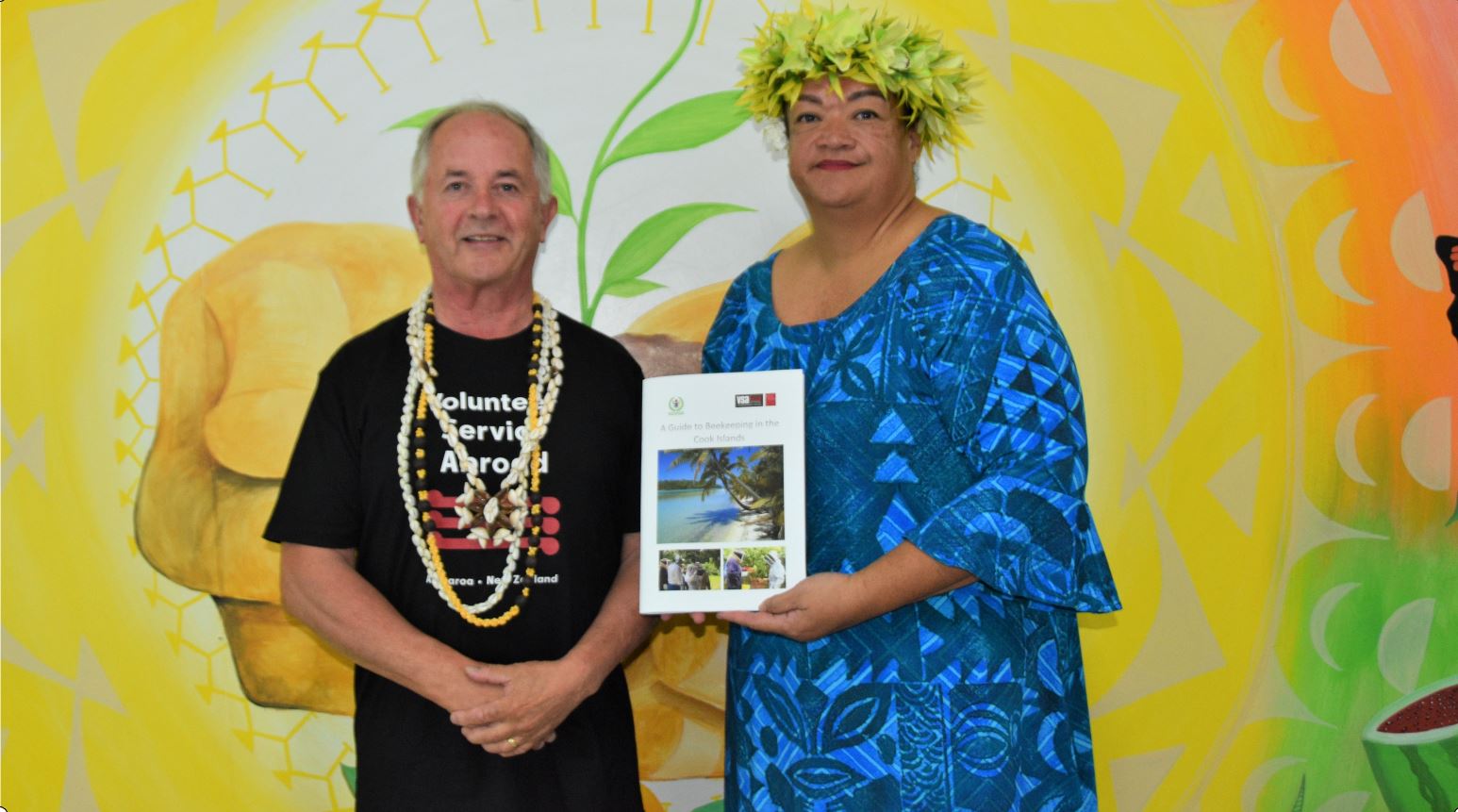Ministry launches ‘A Guide to Beekeeping in the Cook Islands’
Thursday 11 August 2022 | Written by Melina Etches | Published in Local, National

Secretary of Agriculture, Temarama Anguna-Kamana and Beekeeping Advisor (VSA) Volunteer Services Abroad, David Cramp. Photo: MELINA ETCHES/22081001
The Cook Islands has “unbelievably feisty bees,” according to Volunteer Services Abroad (VSA) beekeeping advisor David Cramp.
Cramp has been stationed in Rarotonga for the past three months, working with the Ministry of Agriculture and beekeepers in the community.
Not only has he been busy visiting and checking out the beehives around the island and on the island of Mauke, Cramp has been writing a manual – the first ‘A Guide to Beekeeping in the Cook Islands’ which will benefit the existing 20 local beekeepers and the upcoming ones.
Cramp said most beekeeping books were too generic, something a bit more specific to the Cook Islands was better.
“I kept the manual fairly simple and basic, it is designed for beekeepers in the community and for beekeepers who want to start out, newcomers can pick it up and get started,” he said.
A special farewell function and launch of the book was held yesterday morning at the Ministry of Agriculture office in Arorangi.
Speaking about the types of bees in the Cook Islands, Cramp explained: “The dark coloured bees are probably the old British dark bees or the Northern European and some bees found on the island of Mauke are yellower, which means they are probably Italian honey bees brought in by New Zealand – so they’re noticeably more calm and nicer to deal with. “
“Bees are humankinds only true wild livestock.
“You can never have a pet bee … no matter how nice you are or if you feed them. They don’t care, whether you feed them every day, every week or never.
“To a bee, the beekeeper is rather an irrelevance or someone to be attacked… that’s how bees are and because for the simple fact they are truly wild they don’t take any notice of the restrictions placed on them by beekeepers or farmers.”
Bees adapt to the local conditions on their own, they adapt to the local flora, the local seasonal flow, the climate and local topography, Cramp said.
“The beauty of this is you can do nothing about it except manage those adaptations, and so bees in the Cook Islands have adapted themselves over a couple of hundreds of years to the seasonal flows of the Cook Islands,” he said.
“It’s always a two-way exchange and I’ve learnt an awful lot here. I’m glad I was able to pass on some knowledge.”
Secretary of Agriculture, Temarama Anguna-Kamana said Cramp had also written standards of welfare for livestock which will be included in the Agriculture regulations.
“The partnership with VSA is a huge benefit to the Ministry of Agriculture since we don’t have the capacity in the ministry to write this documentation in country,” said Anguna-Kamana.
“Cramp’s expertise has really lifted the profile for beekeeping in the Cook Islands and provided some support to beekeepers – and now we have a guide they can use and he has trained our staff to also provide support.”
Tina Mackie, the VSA programme manager for Cook Islands, Tonga and Niue, worked with Cramp in Tonga before Covid-19 disrupted plans.
“It’s never about people coming and going, its very much about collaboration which is exactly what happened here over the last three months,” said Mackie.
“The success of an assignment is equally what the volunteer brings and what the partner organisation brings,” she said, thanking Agriculture for their hospitality and enthusiasm.
‘A Guide to Beekeeping in the Cook Islands’ can be purchased at the Ministry of Agriculture in Arorangi for $25 each.









































